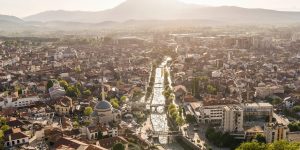By Johann Sattler
Each morning before heading to work, I check the app on my phone that tells me the air pollution level in my part of Sarajevo. When the level is high, I skip my morning run. Lately, this has been happening almost daily as my app has given me a reading in the region of 150 microscopic particles (known as PM2.5) per cubic metre, while the standard safety ceiling of concentration is 50. Unfortunately, even without the app the pollution is visible in the winter, with the thick smog filled with smoke from the burning of wood and coal and emissions that pollute the air.
It is high time for us to confront the problem of air pollution, which seriously endangers the health of all citizens in Bosnia and Herzegovina.
According to the World Health Organisation, this country is among the top three in the world with the highest mortality rate from air pollution. An estimated 558 people per 100,000 die every year in Bosnia and Herzegovina as a direct result of contaminants in the air. Compare that to Sweden, for example, where the rate is one person per 100,000 inhabitants.
Of course, with the many challenges the country faces, unfortunately, some people take the view that pollution isn’t a priority. Others argue that it cannot be solved right now, because improving the quality of air would mean banning coal fires in people’s homes and taking old cars off the road, thus hurting low-income families. There is also an enduring assumption that pollution is unavoidable as a result of a city’s geographical position, as it is the case with Sarajevo sitting in a basin, or as an unwelcome but inevitable by-product of economic growth. It’s the price to pay for prosperity.
However, the truth is that pollution compounds many of the other problems the country already faces. Sickness and absenteeism caused by smog-induced illnesses have a measurable, negative economic impact. It is also true that coal fires and CO2 emitting cars can be phased out in ways that do not penalise vulnerable citizens until appropriate steps towards their full abolishment are taken. Fixing pollution will improve the quality of life for all citizens regardless of income.
Air pollution was the focus of the conference organised last month by the EU office in Bosnia and Herzegovina, with the support of the Swedish Embassy in BiH and the Regional Cooperation Council (RCC). Two things emerged very clearly from the discussion. The first is that “clean” economic growth is not just possible; it is more efficient than the old model based on industrial pollution. The second is that all citizens will benefit from a rapid and well-planned transition from fossil fuels.
The European Union is preparing to embark on a post-pandemic “circular” model of economic recovery. Instead of digging things out of the ground, burning them and then digging up more, the Green Deal aims to establish a model in which natural resources are re-used in a continuous cycle. To achieve the goal of Europe becoming a climate-neutral continent by 2050, complementary environmental initiatives are also needed in the countries neighbouring the European Union.
In this context, the Declaration on the Green Agenda for the Western Balkans, which was endorsed by regional leaders at the Sofia Summit on 10 November, complements the EU Green Deal. Bosnia and Herzegovina will benefit from this initiative, which is designed to spur and sustain prosperity without pollution.
The Green Agenda sets out actions and recommendations to deliver decarbonisation, depollution of air, water and soil, a “circular” approach to development, new methods for farming and food production, and protection of biodiversity.
The EU will support a transition to sustainable energy in the region through IPA III, the Western Balkans Investment Fund, and other financial instruments, and the European Commission and the International Financial Institutions are discussing ways of supporting specific projects. Last month, the European Commission adopted a comprehensive Economic and Investment Plan for the Western Balkans envisaging up to €9 billion of EU funding for key investments including accelerating green transition.
So far, Bosnia and Herzegovina has taken hardly any steps to protect the environment. But this does not mean that quick gains cannot be made if decisive action is taken now. Last month’s conference highlighted solutions that are available and that can be replicated from other cities that are struggling with the same challenges, but finding ways to overcome them. The European Union stands ready to help the authorities in Bosnia and Herzegovina implement these solutions in tandem with steps being taken all across the European continent.
If this winter is like last one, in addition to my inability to go running again until next spring, people all across the region will face another season of smog and the ailments that come with it. I would encourage all to download an app providing real-time air-pollution readings and forecasts for cities across Bosnia and Herzegovina. You will see that it is not enough simply to look out the window to judge if the air-pollution level is unhealthy. Even on a clear and sunny day, the air may not be clean or healthy.
We shouldn’t have to put up with this.
We all have the right to health and to breathe fresh, clean air.




